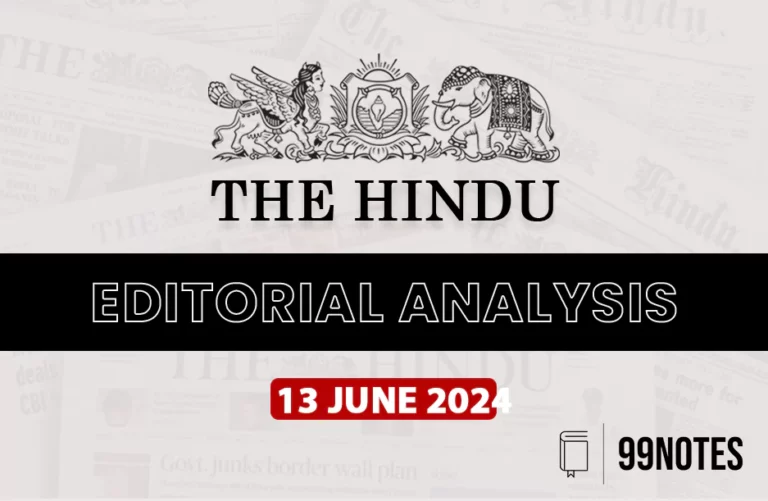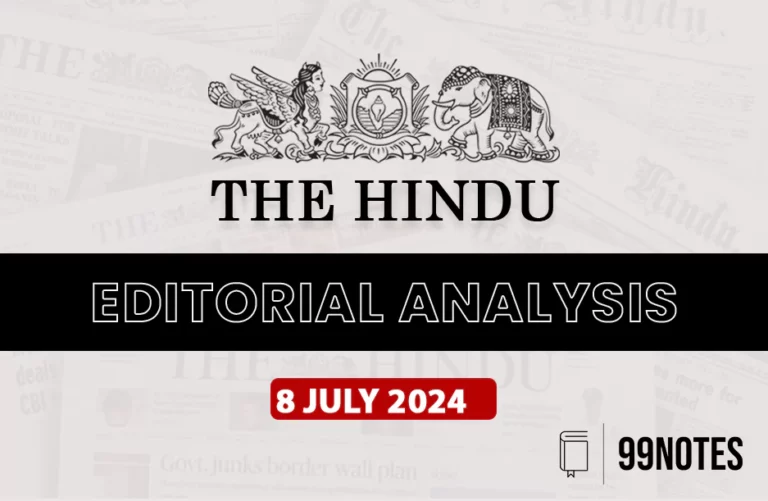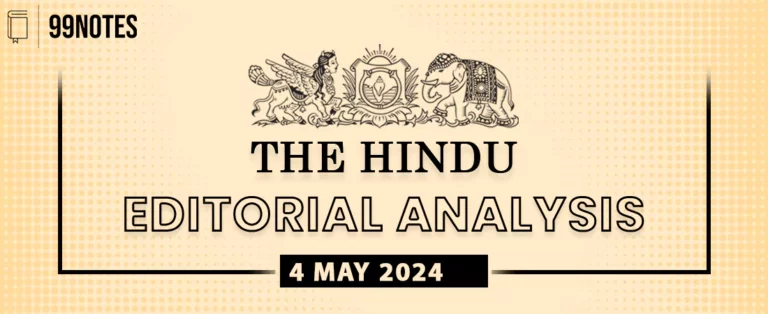4 August 2023 : The Hindu Editorial Notes PDF
The Hindu Editorial
4-August-2023
Daily Current Affairs For UPSC ,The Hindu Editorial Summary
1. Should the age of consent be revised in India?
Topic: GS2 – Indian polity.
Context:
- Bombay High Court debates reducing the age of consent for sex in India
- Protection of Children from Sexual Offences (POCSO) Act has led to prosecution of adolescents for consensual relationships with minors
- Need for an integrated and holistic approach to the debate, considering psychological, biological, and other factors.
Arguments for reducing the age of consent:
- Preventing criminalization of consensual relationships among adolescents, which may not involve coercion or exploitation.
- Allowing for a more nuanced approach to cases involving adolescents close in age, where both parties may be minors.
- Recognizing that adolescents may be exploring their sexuality and engaging in age-appropriate relationships.
- Avoiding the potential harm of branding young individuals as sex offenders for consensual interactions.
- Reducing the burden on the legal system by focusing on cases that involve actual harm or exploitation.
- Promoting open discussions about sex, relationships, and consent, leading to better awareness and understanding among young people.
- Criminalizing approach of the law limits a more comprehensive discussion on the subject.
- Age of consent should be context-sensitive and based on capacity rather than a fixed number
Arguments against reducing the age of consent:
- Protection of minors from potential exploitation and abuse by older individuals who may take advantage of the lowered age of consent.
- Ensuring that young individuals have the necessary emotional and cognitive maturity to make informed decisions about sexual relationships.
- Avoiding the normalization of early sexual relationships that may not be developmentally appropriate for minors.
- Preventing potential negative consequences of early sexual activity, such as unplanned pregnancies and sexually transmitted infections.
- Maintaining the legal framework that discourages sexual relationships involving significant age differences between partners.
- Upholding the principle of age-appropriate relationships and protecting the vulnerable position of minors in society.
- Ensuring consistency with other laws and international conventions related to the age of consent and child protection.
Way forward:
- Holistic Approach: Consider multiple perspectives, including psychological, biological, social, and cultural factors, while determining the age of consent. This approach can help arrive at a nuanced and context-sensitive decision.
- Stakeholder Consultation: Engage with experts, psychologists, sociologists, child rights activists, and other stakeholders to understand the implications of any change in the age of consent.
- Informed Policy Discussions: Initiate open and informed policy discussions at the national and regional levels to involve various sections of society and ensure diverse viewpoints are considered.
- Expert Committee: Form a committee of experts to evaluate the existing evidence, study international best practices, and recommend a suitable age of consent for consensual relationships.
- Protecting Vulnerable Adolescents: Focus on strengthening the implementation of the POCSO Act to protect minors from sexual exploitation and abuse, irrespective of any changes in the age of consent.
- Holistic Sex Education: Emphasize the importance of comprehensive sex education to equip adolescents with knowledge and skills to make informed decisions about relationships and sexuality.
- Alternative Solutions: Explore alternative measures to address the issue of adolescents being criminalized under the POCSO Act, such as diverting cases to counseling and support services rather than the criminal justice system.
Model question: “Examine the implications of reducing the age of consent in the context of the POCSO Act, 2012, in India. Discuss the arguments for and against such a change and propose a balanced way forward that safeguards the rights of minors while considering the evolving capacities of adolescents.”
2. The state must remain impartial in situations of communal conflict.
Topic: GS2 – Indian polity.
Context:
- Recent communal clashes in Haryana resulted in six deaths and left 70 injured.
- The clashes were triggered when local Muslims pelted stones at a Hindu religious procession in Nuh district on July 31.
- From administrative perspective, the state must remain impartial in situations of communal conflict..
The need for state to remain impartial:
- Impartiality ensures fair and just treatment for all parties involved in communal conflicts.
- It helps prevent bias or favoritism towards any particular religious or ethnic group.
- An impartial state fosters trust among all communities and promotes social cohesion.
- It upholds the principles of secularism and equality enshrined in the constitution.
- An impartial approach by the state discourages further violence and retaliation.
- It enhances the credibility and legitimacy of law enforcement and the administration.
- An unbiased approach ensures that the rule of law is upheld, and justice is served to all victims and perpetrators equally.
Challenges in handling such situations:
- Political interference and pressure on law enforcement agencies, which may hinder their ability to take impartial and decisive action.
- Lack of proper intelligence and surveillance capabilities to identify and address potential sources of communal tension.
- Deep-rooted social and religious divides that make it difficult to build trust and cooperation between communities and law enforcement.
- Inadequate resources and training for law enforcement personnel to handle sensitive situations and maintain peace effectively.
- Spread of misinformation and fake news on social media, which can escalate tensions and fuel violence.
- Manipulation of communal sentiments by vested interests for political or social gains.
- Slow and inefficient judicial processes, leading to delays in justice and lack of accountability for perpetrators.
- Challenges in balancing freedom of speech and expression with the need to prevent hate speech and incitement to violence.
- The potential for communal conflicts to escalate into larger-scale riots and destabilize entire regions.
Possible way forward:
- Strengthening intelligence gathering and surveillance to identify potential sources of communal tension in advance.
- Swift and decisive action by law enforcement agencies to prevent any escalation of violence.
- Proactive engagement with local community leaders and civil society to address grievances and build understanding.
- Developing and implementing community policing strategies to foster trust and cooperation between law enforcement and the public.
- Conducting impartial and transparent investigations into incidents of communal violence to hold perpetrators accountable.
- Providing adequate training to law enforcement personnel on handling sensitive situations and maintaining impartiality.
- Raising awareness about the consequences of communal conflicts and promoting peacebuilding initiatives.
- Strengthening legal frameworks to address hate speech and incitement to violence effectively.
- Encouraging inter-faith dialogues and initiatives to promote harmony and mutual respect among different communities.
Model question: “Communal conflicts pose significant challenges to social harmony and stability in India. Discuss the role of the state in handling such situations while remaining impartial and the changes needed to address these challenges effectively.”
For Enquiry

4 August 2023 : The Hindu Editorial Notes PDF

4 August 2023 : Daily Current Affairs

3 August 2023 : Daily Answer Writing

2 August 2023 : Daily Answer Writing

1 August 2023 : Daily Answer Writing

31 July 2023 : Daily Answer Writing

28 July 2023 : Daily Answer Writing

27 July 2023 : Daily Answer Writing

26 July 2023 : Daily Answer Writing

25 July 2023 : Daily Answer Writing
The Hindu 4 August 2023 : The Hindu Editorial Notes PDF The Hindu Editorial
2-August-2023
Daily Current Affairs For UPSC ,The Hindu Editorial Summary
Facebook-f
Twitter
Youtube
1. The…
Daily Current Affairs 4 August 2023 : Daily Current Affairs DAILY CURRENT AFFAIRS
Daily Current Affairs For UPSC ,Daily Current affairs of The hIndu and Indian Express.
4-August-2023
Facebook-f
Twitter
Youtube
1. Over…
mains answer writing 3 August 2023 : Daily Answer Writing Mains Answer Writing
One of the key components of these exams is the written test, which consists of…
mains answer writing 2 August 2023 : Daily Answer Writing Mains Answer Writing
One of the key components of these exams is the written test, which consists of…
mains answer writing 1 August 2023 : Daily Answer Writing Mains Answer Writing
One of the key components of these exams is the written test, which consists of…
mains answer writing 31 July 2023 : Daily Answer Writing Mains Answer Writing
One of the key components of these exams is the written test, which consists of…
mains answer writing 28 July 2023 : Daily Answer Writing Mains Answer Writing
One of the key components of these exams is the written test, which consists of…
mains answer writing 27 July 2023 : Daily Answer Writing Mains Answer Writing
One of the key components of these exams is the written test, which consists of…
mains answer writing 26 July 2023 : Daily Answer Writing Mains Answer Writing
One of the key components of these exams is the written test, which consists of…
mains answer writing 25 July 2023 : Daily Answer Writing Mains Answer Writing
One of the key components of these exams is the written test, which consists of…






